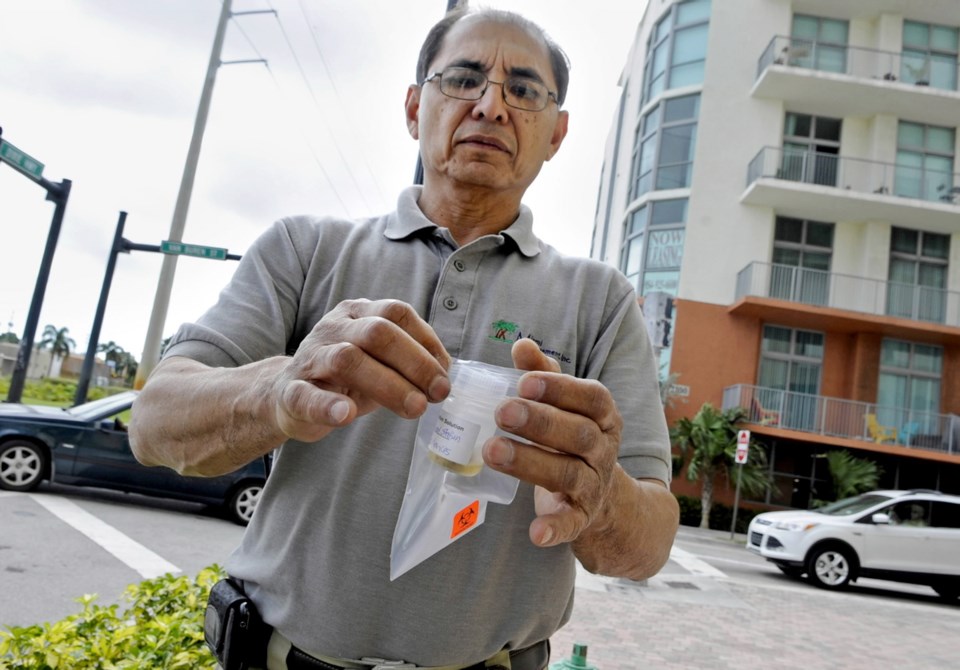FORT LAUDERDALE, Florida — Tiffany Acosta had a problem. The issue of dog droppings at the properties she manages had gotten so out of hand that neighbours were fighting with each other.
Nothing worked to resolve the issue. So late last year Acosta took an extreme measure. She made every dog in the 360-unit Hollywood Station complex submit to DNA testing — yes, DNA testing — and now when a complex employee finds a mess and tests it, the pet owner gets fined as much as $150.
And that has just about solved the problem, she said.
“It’s been very successful,” Acosta said. “I think [the DNA testing] changed people’s behaviour.
“It’s brought light to how bad it is. We had to go to this extent.”
The DNA-tracking capability has motivated residents to pick up after their pets and has improved the messy situation by at least 85 per cent, Acosta said. About 15 to 20 pet owners have been fined after the DNA collection, she said.
It doesn’t take much to start the program. Dog DNA collection is a “very simple, easy, mess-free, pain-free” process, said Eric Mayer, business development director for BioPet Vet Lab.
Pet owners swab inside the mouths of their dogs and then mail the swab in a special container to the Tennessee-based laboratory for storage, said Acosta. The dog’s identifying information is stored in a database.
“At that point, the community pet policy is now enforceable,” Mayer said.
Acosta said it costs $35 to register pets and $50 to analyze the waste samples. Hollywood Station doesn’t charge residents to register their pets — it’s part of their nonrefundable $350 pet deposit — but subsequent fines are subtracted from their security deposit, Acosta said. They’ve upped their violation fee from $100 to $150 to compensate for the testing costs.
Whenever people don’t scoop their dogs’ waste, Hollywood Station employees head out to the scene, put on gloves and with a spatula collect a small portion — “the crust” — of the poop, Acosta said. The employee drops the sample into a solution-filled bottle, about 10 centimetres tall, seals it, shakes it and labels it with the time and place of the evidence. Some employees are thrilled to get a match.
Employee Clifton Allman “gets so excited when he gets another one,” Acosta said. “He cares.”
Hollywood Station resident Anthony Presciano also cares about the upkeep of the property, but he said he’s been fined by the pooper troopers three times — for a total of $450 — for his basset hound’s accidents. “The penalty is quite severe,” Presciano said.
Presciano says he picks up after Luigi, but he was fined for incidents when Luigi went twice in one outing and Presciano didn’t have a second bag to pick up after him.
The “paranoid” policing is one of the factors that’s prompted Presciano not to renew his lease, he said. After two years of living in the neighbourhood, he will soon move to a quieter place, Presciano said. “You live here, you don’t want to feel uncomfortable,” he said.
About one-third of residents in the townhomes, condominiums and lofts own the estimated 100 dogs living at the properties, Acosta said. The dogs make a mess, and many owners don’t bother with cleaning up.
“That’s 200 piles of poop a day that people don’t pick up. That’s a lot of poop,” Acosta said.
BioPet Vet Lab, which works with hundreds of groups in 35 states, gets involved when condo associations get frustrated after unsuccessfully trying several ways to catch the culprits, Mayer said.
“They’re fed up with residents complaining. And visitors who are looking to buy condos, if they see mess on the ground, they decide not to live there,” Mayer said.
Acosta encouraged neighbours and employees to report — and even take pictures — of residents who aren’t picking up their dog’s feces. At one point the situation was so bad she hired an off-duty Hollywood police officer to monitor the site for a week, costing her more than $1,000, she said.
She even offered a “finder’s fee” of $20 to those who helped track the owners.
None of that helped.
“We didn’t catch anybody,” Acosta said. “I was just trying to prove to the board and residents that it’s not as easy as you think to catch people.”
Acosta used to joke about collecting dog DNA for poop-tracking purposes before realizing there was actually a company doing that, she said.
“When we found out, it was a no-brainer,” Acosta said.
